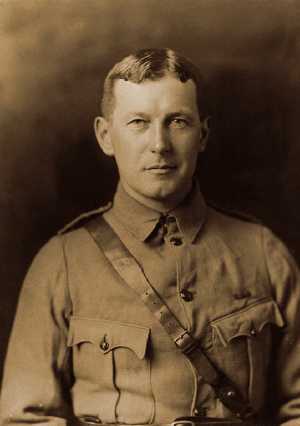 SKC Films Library SKC Films Library |
|
|
|
|
| SKC Films Library >> Linguistics,
Languages, and Literatures
>> American
Literature >> Canadian Literature |
|
 John
McCrae John
McCraedoctor-poet John McCrae was born in Guelph, Ontario, on November 30, 1872, son of Lieutenant-Colonel David McCrae and Janet Simpson Eckford McCrae. He joined the Highland Cadet Corps at the age of 14 and the militia when he was 17, and graduated from the Guelph Collegiate Institute at the age of 16. The first Guelph student to win a scholarship to the University of Toronto, he received his Bachelor of Arts from that institution in 1894, and his Bachelor of Medicine in 1898. While at the university, he had 16 poems and several short stories published in a variety of magazines, including Saturday Night. Early Career During his third year of medical studies, McCrae completed a residency at the Robert Garrett Hospital, a children's convalescent home outside Baltimore, Maryland. After receiving his degree, he worked as resident house officer at Toronto General Hospital. When the Boer War started in October 1899, McCrae felt it was his duty to fight. In order to serve in South Africa, he requested postponement of a fellowship in pathology that he had been awarded at McGill University in Montreal. He was subsequently commissioned to lead an artillery battery from his home town, sailed to Africa in December, and spent a year there with his unit. Upon returning to Montreal in 1901, McCrae resumed his studies in pathology. As Governor's Fellow in pathology and resident assistant pathologist, he had the dual function of research work in the Medical Faculty laboratories at McGill and autopsy duties at Montreal General Hospital. In 1902, he was appointed resident pathologist at Montreal General Hospital and later also became assistant pathologist to the Royal Victoria Hospital. In 1904, he was appointed an associate in medicine at the Royal Victoria Hospital. Later that year, he went to England where he studied for several months and became a member of the Royal College of Physicians. In 1905, he set up his own practice, although he continued to work and lecture at several hospitals. In 1912, he was the co-author, with J. G. Adami, of a medical textbook, A Text-Book of Pathology for Students of Medicine. "In Flanders Fields" On August 14, 1914, Great Britain declared war on Germany, meaning that Canada, as a member of the British Empire, was also at war. Within three weeks, 45,000 Canadians, including McCrae, had rushed to join the Canadian Army. McCrae was appointed brigade-surgeon to the First Brigade of the Canadian Field Artillery with the rank of Major and second-in-command. Major McCrae had been treating wounded at Ypres for seventeen days when, on May 2, 1915, friend and former student Leutenant Alexis Helmer was killed by a shell burst. Like thousands of his comrades, Helmer was buried in a makeshift cemetery near the field hospital, and the site of the thousands of wooden crosses in a field full of bloming poppies had a profound affect on McCrae. The folowing day, while sitting on the back of an ambulance, McCrae vented his feelings by writing the following poem:
Having expressed his feelings in verse, McCrae actually tossed the poem away after writing it, but a fellow officer retrieved it and sent it to newspapers in England; "In Flanders Fields" was published in Punch magazine on December 8, 1915. On June 1, 1915, McCrae was transferred to No. 3 (McGill) Canadian General Hospital in France, where he was made Chief of Medical Services. The hospital was housed in huge tents at Dannes-Cammiers until cold wet weather forced a move to the site of the ruins of the Jesuit College at Boulogne. He died there of pneumonia on January 28, 1918, and was buried with full military honors in Wimereux Cemetery, just north of Boulogne. A collection of his poems, In Flanders Fields and Other Poems, was published in 1919. SEE ALSO |
|
SKC Films Library >> Linguistics, Languages, and Literatures >> American Literature >> Canadian Literature This page was last updated on 01/28/2017. |